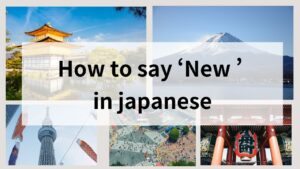Are you curious about how to say “Friday” in Japanese? The day of the week holds various cultural meanings and associations in Japan, from work schedules to social activities. This guide will explore the Japanese word for “Friday,” its cultural significance, and practical applications.
How Do You Say “Friday” in Japanese?
The Japanese word for “Friday” is 金曜日 (kinyōbi). This term is widely recognized and used in both casual and formal contexts. The name is derived from the Japanese word for gold, reflecting its historical connections to wealth and prosperity.
The Japanese Word for Friday: Kinyōbi (金曜日)
“Kinyōbi” is a term used to describe Friday, and it appears in various phrases and contexts. For example:
- 金曜日に会いましょう (Kinyōbi ni aimashou): “Let’s meet on Friday.”
- 金曜日は仕事が終わる (Kinyōbi wa shigoto ga owaru): “I finish work on Friday.”
- 金曜日の夜 (Kinyōbi no yoru): “Friday night.”
Kanji for Friday: 金曜日
The kanji for Friday is 金曜日, which consists of three characters: 金 (kin), meaning “gold”; 曜 (yō), meaning “day of the week”; and 日 (bi), meaning “day.” This combination reflects the historical significance of gold and wealth in Japanese culture. The primary reading is きんようび (kinyōbi).
Examples of phrases containing the kanji 金曜日 include:
- 金曜日の会議 (Kinyōbi no kaigi): “Friday meeting.”
- 金曜日は休み (Kinyōbi wa yasumi): “Friday is a holiday.”
- 金曜日の予定 (Kinyōbi no yotei): “Plans for Friday.”
This kanji is commonly used in everyday language, particularly in scheduling and planning contexts. Recognizing these patterns can help learners understand the nuanced use of 金曜日 in Japanese.
Does “Friday” Work in Japanese?
The English word “Friday” is generally understood in Japan, especially among younger generations or those familiar with Western culture. However, its recognition might be less universal among older individuals or in more traditional contexts. A 5-point scale rates its comprehension as:
- Rating: 3 – Generally understood (40-60% of people)
Rating Details
Understanding the 5-Point Rating for English Words in Japan
The following ratings help explain how English words are typically understood in Japan. The scale is based on context, familiarity, and the target audience.
- 5 - Universally understood (80% or more):
Words that are widely adopted into everyday Japanese, such as "coffee" (コーヒー) or "computer" (コンピューター). These words are part of the standard vocabulary and are recognized by nearly everyone. - 4 - Generally understood (60-80%):
Words that are familiar to most people but might require context for full comprehension. Examples include terms commonly used in specific industries or by younger generations. - 3 - Understood in half of the cases (40-60%):
Words that depend heavily on pronunciation or context. For example, technical terms or less common foreign words that some people may not immediately recognize. - 2 - May not be understood (20-40%):
Words that are unfamiliar to most Japanese speakers unless they have significant exposure to English or specific cultural contexts. These words are often better replaced with their Japanese equivalents. - 1 - Rarely understood (20% or less):
Highly specialized or obscure terms that are unlikely to be recognized by the general public. Clear communication requires the use of Japanese vocabulary or additional explanation.
This rating system provides a practical guide for determining when and how to use English words effectively in Japan. Understanding the audience and context is key to ensuring clear communication.
If clarity is crucial, using the Japanese term 金曜日 (kinyōbi) is recommended. While “Friday” may be understood in certain contexts, “kinyōbi” ensures effective communication.
The Cultural Significance of Friday in Japan
Friday has a unique significance in Japanese culture, often marking the transition from the workweek to the weekend. It is a day when many people look forward to relaxing and socializing after a busy week.
Friday as the Start of the Weekend
In Japan, the workweek typically runs from Monday to Friday, making Friday an important day for employees. Many workers celebrate the end of the week by going out for drinks or dinner with colleagues or friends, a practice known as 飲みニケーション (nomi-nication), which translates to “drinking communication.”
Friday in Japanese Pop Culture
Friday also plays a role in modern Japanese pop culture. For example, many television shows and anime episodes premiere on Fridays, creating excitement for viewers. This anticipation contributes to the cultural significance of the day as a time for entertainment and leisure.
Practical Applications of “Friday” in Japanese
Learning how “Friday” is used in Japanese can help you navigate conversations, understand idioms, and recognize its presence in Japanese culture.
Talking About Friday in Daily Conversation
Here are some examples of how “kinyōbi” is used in everyday conversation:
- 金曜日は仕事がある (Kinyōbi wa shigoto ga aru): “I have work on Friday.”
- 金曜日に友達と遊ぶ (Kinyōbi ni tomodachi to asobu): “I will hang out with my friends on Friday.”
Friday-Related Idioms or Expressions
While there are relatively few specific idioms involving “kinyōbi,” the day is often associated with relaxation and social activities. Here are some expressions that incorporate or symbolize Friday:
- 金曜日の夜に (Kinyōbi no yoru ni): “On Friday night,” often used to suggest plans for going out or having fun.
- 金曜ロードSHOW! (Kinyōbi Rōdo Shō!): A popular television program that airs on Friday nights, showcasing movies and entertainment.
These expressions reflect the anticipation and excitement that many feel as they approach the weekend, highlighting the social aspect of Friday in Japanese culture.
Friday in Japanese Cuisine or Products
While “Friday” itself may not have direct connections to cuisine, the end of the workweek often leads to food-related activities. Many people enjoy dining out or ordering takeout on Friday nights, making it a social occasion in Japan.
FAQs
Here are some frequently asked questions about Friday in Japanese culture and language.
Is Friday a Popular Day in Japan?
Yes, Friday is a popular day in Japan as it signals the start of the weekend. Many people look forward to socializing and relaxing after a long workweek.
How Do You Write “Friday” in Japanese?
The word “Friday” can be written in three different scripts in Japanese: hiragana, katakana, and kanji. Each script serves different purposes depending on the context and formality. Here’s a breakdown:
- Hiragana (きんようび, kinyōbi):
Hiragana is the most commonly used script for “Friday” in casual writing or when teaching children. It is simple and easy to read, making it ideal for everyday use. - Katakana (キンヨウビ, kinyōbi):
Katakana is rarely used for “Friday,” but it may appear in stylistic contexts, such as advertisements or when emphasizing the word in text. - Kanji (金曜日, kinyōbi):
Kanji is the most formal and traditional way to write “Friday.” It is often used in literature, official documents, and cultural contexts, conveying a sense of formality.
Choosing which script to use depends on the tone, audience, and purpose of your communication. Understanding these variations can enhance both your written and spoken Japanese skills.
Conclusion
Friday, or “kinyōbi” in Japanese, is not just a day of the week—it symbolizes the transition to relaxation, socialization, and entertainment. By understanding its role in Japanese language and culture, you can deepen your appreciation for this significant day and its place in Japanese society.








